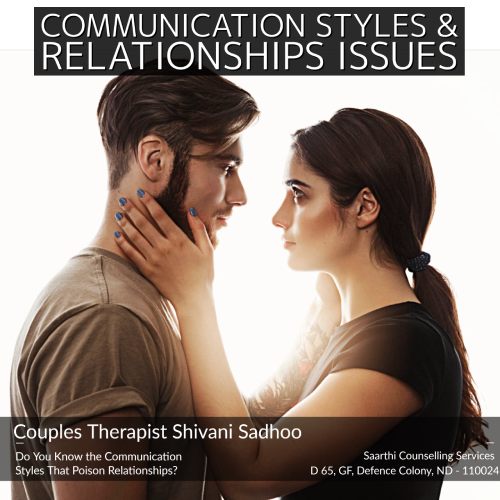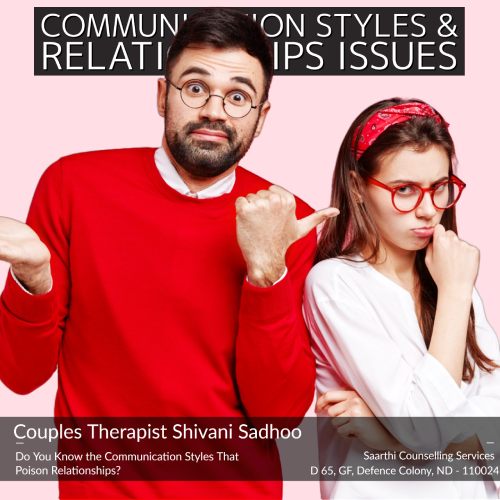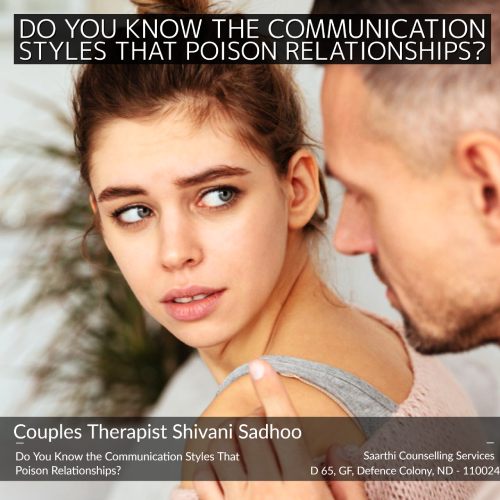Do You Know the Communication Styles That Poison Relationships?
Top Marriage Counselor Shivani Sadhoo Explains
Effective communication is the foundation of healthy relationships, be it romantic, familial, or professional. The way we express ourselves and listen to others greatly impacts the dynamics and overall satisfaction within these relationships.
Unfortunately, certain communication styles can act as poison, gradually eroding trust, understanding, and harmony. In this article, Delhi’s top marriage counsellor Shivani Misri Sadhoo shares some toxic communication styles and provides guidance on how to avoid them, fostering healthier and more fulfilling connections.
Passive Aggression
Passive-aggressive communication is characterized by indirect expressions of hostility, disguised as passivity or sarcasm. This style often involves subtle jabs, backhanded compliments, or withholding information to create tension and manipulate others.
It can leave the recipient feeling confused, hurt, and frustrated, ultimately leading to deteriorating relationships. Instead, strive for open and honest dialogue, addressing concerns directly without resorting to hidden agendas or covert hostility.
Defensiveness
Defensive communication is a self-protective response that arises from feeling attacked or criticized. It involves denying responsibility, making excuses, or deflecting blame onto others. When both parties engage in defensiveness, it creates a cycle of negativity, hindering effective problem-solving and resolution. To break this pattern, practice active listening and empathy, focusing on understanding the other person’s perspective without immediately jumping to self-defence.
Stonewalling
Stonewalling occurs when an individual withdraws from a conversation or relationship, shutting down emotionally and refusing to engage. It can manifest as silent treatment, avoidance, or dismissing the other person’s concerns.
Stonewalling prevents open communication and leaves the other person feeling unheard and invalidated. Instead, strive for open dialogue, even if it feels uncomfortable, and make a conscious effort to actively participate in resolving conflicts.
Blaming and Criticizing
Blaming and criticizing communication styles involve focusing on faults and mistakes rather than seeking constructive solutions. This approach creates a hostile and judgmental environment, where individuals feel attacked and defensive.
Instead of blaming and criticizing, practice constructive feedback by expressing your concerns using “I” statements, focusing on specific behaviours, and offering suggestions for improvement. This allows for a more collaborative and growth-oriented approach.
Gaslighting
Gaslighting is an insidious form of manipulation that aims to make the other person doubt their own perceptions, memories, and sanity. This toxic communication style involves distorting the truth, denying events, or trivializing the other person’s feelings and experiences. Gaslighting erodes trust, undermines self-esteem, and can lead to psychological harm. It is crucial to recognize gaslighting behaviours and establish boundaries to protect your emotional well-being and maintain healthy relationships.
Marriage counsellor Shivani says effective communication is the lifeblood of any successful relationship, and toxic communication styles can poison even the strongest bonds. By being aware of these destructive patterns and actively working to avoid them, we can foster healthier connections built on trust, empathy, and understanding. Remember to practice open dialogue, active listening, and respect for each other’s feelings and perspectives. By doing so, we can cultivate relationships that thrive and bring joy and fulfillment to our lives.
- What To Do if You Feel No Emotional Bond with Your Husband? - July 27, 2024
- Does Living with In-Laws Affect Your Marriage? 5 Ways to Deal - July 23, 2024
- Is Your Job Destroying Your Marriage? 7 Signs to Look for - July 15, 2024


